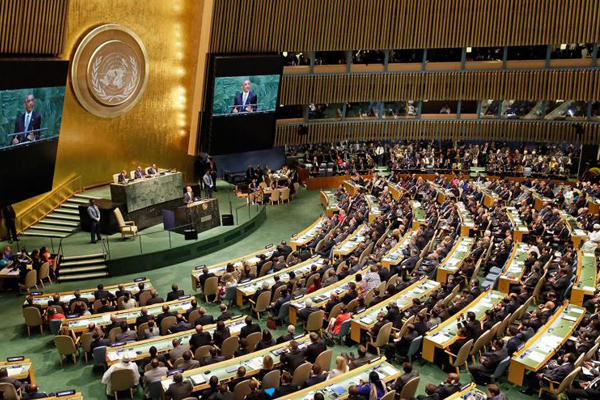Since the creation of the United Nations, the General Assembly has adopted several key Declarations and resolutions, by which it solemnly appeals to all States so that they resolve conflicts and disputes by peaceful means and it also reminds them of their obligations under the Charter.
The General Assembly solemnly proclaimed in the Declaration on the Prevention and Removal of Disputes and Situations that “States should act so as to prevent in their international relations the emergence or aggravation of disputes or situations, in particular by fulfilling in good faith their obligations under international law”. To reach this aim the UNGA will be able to “… initiate studies and make recommendations for the purpose of promoting international co-operation in the political field and encouraging the progressive development of international law and its codification…”.
In accordance with the resolution 1815 (XVII) on the Consideration of principles of international law adopted by the Sixth Committee of the General Assembly on 18 December 1962, the progressive development and codification of the principles of international law concerning friendly relations and co-operation among States should be elaborated through the promotion of international cooperation in economic, social and related fields and the realization of human rights and fundamental freedoms.
On 24 October 1970, on the recommendation of the Sixth Committee, the General Assembly adopted, without a vote, resolution 2625 (XXV), by which it approved the Declaration of international law friendly relations and co-operation among States in accordance with the Charter of the United Nations. In its Preamble, the General Assembly recalled that “the peoples of the United Nations are determined to practice tolerance and live together in peace with one another as good neighbours”.
On several occasions, the General Assembly has stated that the codification of the rules of international law and their progressive development would assist in promoting the “purposes and principles” of the Charter of the United Nations. In particular, the General Assembly resolution 1505 (XV) on the Future work in the field of the codification and progressive development of international law stated that: “the conditions prevailing in the world today give increased importance to the role of international law … in strengthening international peace, developing friendly and co-operative relations among the nations, settling disputes by peaceful means and advancing economic and social progress throughout the world”.
The General Assembly reaffirmed in its resolution 54/27 of 19 January 2000 on the outcome of the action dedicated to the 1999 centennial of the first International Peace Conference, the commitment of the United Nations and its Member States to the adherence to, and the development of international law as a basis for conducting international relations. Furthermore, for a number of years, the General Assembly has reiterated its conviction that peaceful settlement of disputes and the progressive elaboration of international law constitute one of the foundation stones of the rule of law and a clear means to also establish a just and lasting peace all over the world.
On 1st December 1949 the General Assembly adopted resolution 290 (IV) on essentials of peace, by which it declared that the UN Charter, the most solemn pact of peace in history, lays down basic principles necessary for an enduring peace, such as the full respect of fundamental rights expressed in the Universal Declaration of Human Rights. Additionally, GA resolution 380 (V) on peace through deeds, adopted on 17 November 1950, stated that "if all States faithfully reflect this desire and observe their obligations under the Charter, lasting peace and security will be established".
All measures tending to silence or distort the activities of the United Nations in favor of peace should be considered as propaganda against peace in accordance with the resolution 381 (V). As stated by UNGA resolutions 2817 (XXVI) and 3065 (XXVIII), both on scientific work on peace research, fundamental research on the foundations of and conditions for peace, can contribute considerably to the peace mission of the United Nations and build peace, security and cooperation in the world.
The principles codified in article 2 of the Charter of the United Nations constitute the basic foundational principles of the whole body of international law. The Dumbarton Oaks Proposals already listed most of the principles, with the exception of the principle that protects matters essentially within the domestic matters.
The seven principles of international law recognised by the UN Charter in its Art. 2 are the following: 1. Prohibition of the threat or use of force against the territorial integrity or political independence of any State; 2. Settlement of international disputes by peaceful means; 3. Prohibition to intervene in matters within the domestic jurisdiction of any State; 4. Cooperation among States; 5. Self-determination of peoples; 6. Sovereign equality of States and 7. The fulfillment in good faith of international obligations.
In the resolution 2625 (XXV) of 1970 on “Declaration on Principles of International Law concerning Friendly Relations and Co-operation among States in accordance with the Charter of the United Nations”, the General Assembly emphasized that “… the paramount importance of the Charter of the United Nations for the maintenance of international peace and security and that… the adoption of the Declaration…would contribute to the strengthening of world peace and constitute a landmark in the development of international law and of relations among States…”.
The relationship between the full respect of principles enshrined in Art. 2 of the UN Charter and the maintenance of peace and security as a purpose was reaffirmed in the Draft Declaration on Rights and Duties of States of 1949 elaborated by the International Law Commission as follows: “… primary purpose of the United Nations is to maintain international peace and security, and the reign of law and justice is essential to the realization of this purpose”.
Additionally, the promotion of human rights and peace are considered as essential purposes, whose realization should be jointly promoted by Member States of the United Nations in conjunction with the full respect of those principles included in the UN Charter. Therefore, the Charter is considered as the constitution of the international community. It follows that all countries have included this perspective in both national constitutions and regional instruments.
The Universal Declaration of Human Rights (UDHR) is a declaration adopted by the United Nations UNGA on 10 December 1948 at Palais de Chaillot, Paris. The Declaration arose directly from the experience of the Second World War and represents the first global expression of rights to which all human beings are inherently entitled. It consists of 30 articles which have been elaborated in subsequent international treaties, regional human rights instruments, national constitutions and laws.
As indicated by Prof. Eide, “the package of rights contained in the Declaration was not simply the historical product of real-life legal evolution in the positivistic sense, but a set of normative aspirations elaborated in 1948 with the hope that they would, over time, become real rights and, as such, effectively recognized and enjoyed …. The rights in the UDHR were formulated in highly general and abstract terms. This was delivery done in order to maintain a degree of flexibility for States during the required transformation of their internal systems”.
The “Universal Bill of Rights” was completed with the adoption of the two Covenants of 1966, the International Covenant on Civil and Political Rights and the International Covenant on Economic, Social and Cultural Rights.
Both Covenants textually adopted in their respective Preambles the first recital contained in the Preamble of the Universal Declaration of Human Rights. In addition, it expressly recognized the linkage between the UN Charter and the concept of peace and human rights understood in the line of the contributions received during the drafting process of the Charter and Declaration:
“Considering that, in accordance with the principles proclaimed in the Charter of the United Nations, recognition of the inherent dignity and of the equal and inalienable rights of all members of the human family is the foundation of freedom, justice and peace in the world”
Additionally, it should be recalled that the International Convention on the Elimination of All Forms of Racial Discrimination stated in its preamble that discrimination between human beings on the grounds of race, colour or ethnic origin was an obstacle to friendly and peaceful relations among nations and was capable of disturbing peace and security among peoples and the harmony of persons living side by side even within one and the same State.
Furthermore, the Convention on the Elimination of All Forms of Discrimination against Women provided that the full and complete development of a country, the welfare of the world and the cause of peace required the maximum participation of women on equal terms with men in all fields.
Finally, the Convention on the Rights of Persons with Disabilities also reaffirmed the crucial role that human rights in general played in creating fair and equal societies founded upon freedom, justice, development and peace.
David Fernandez Puyana, PhD, LLM and MA


















التعليقات